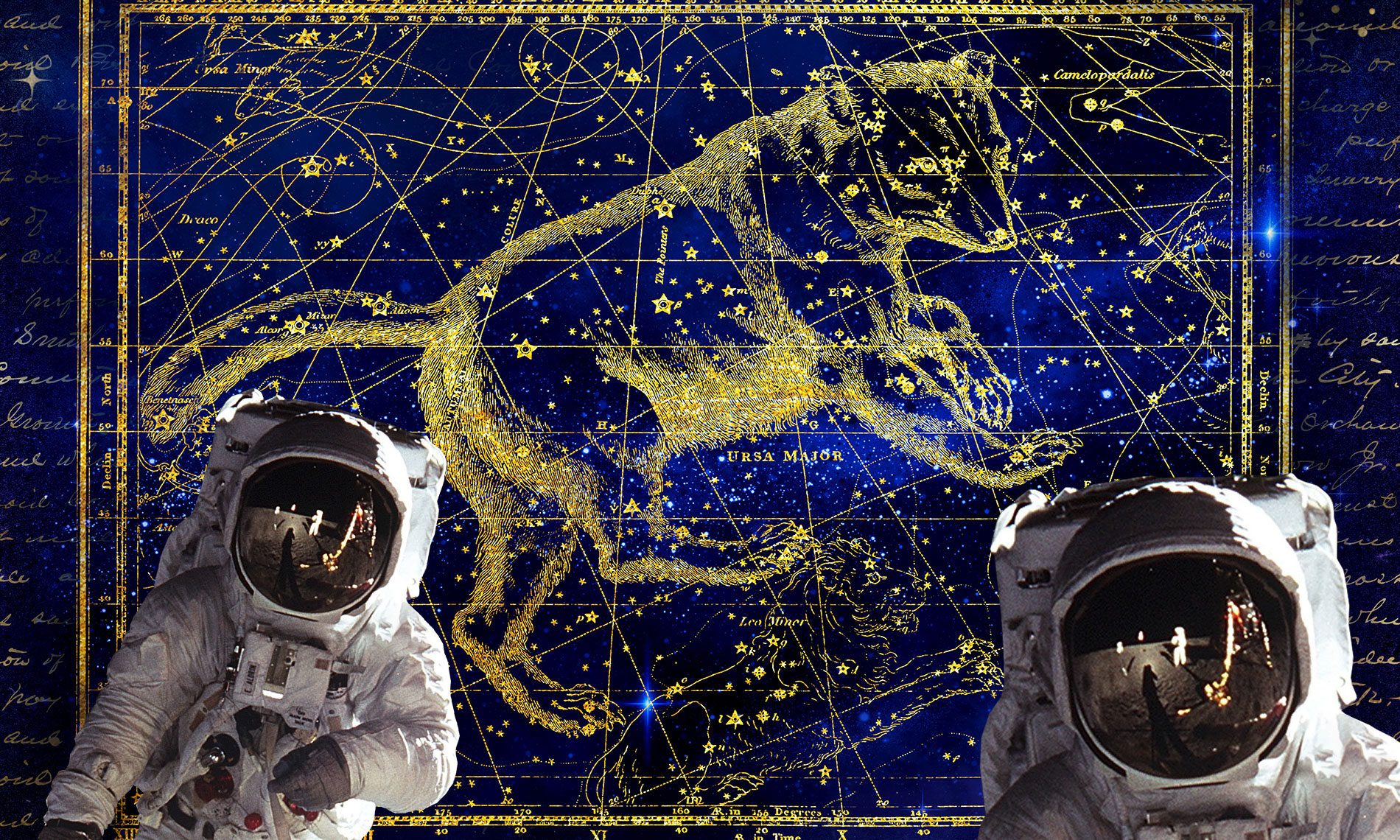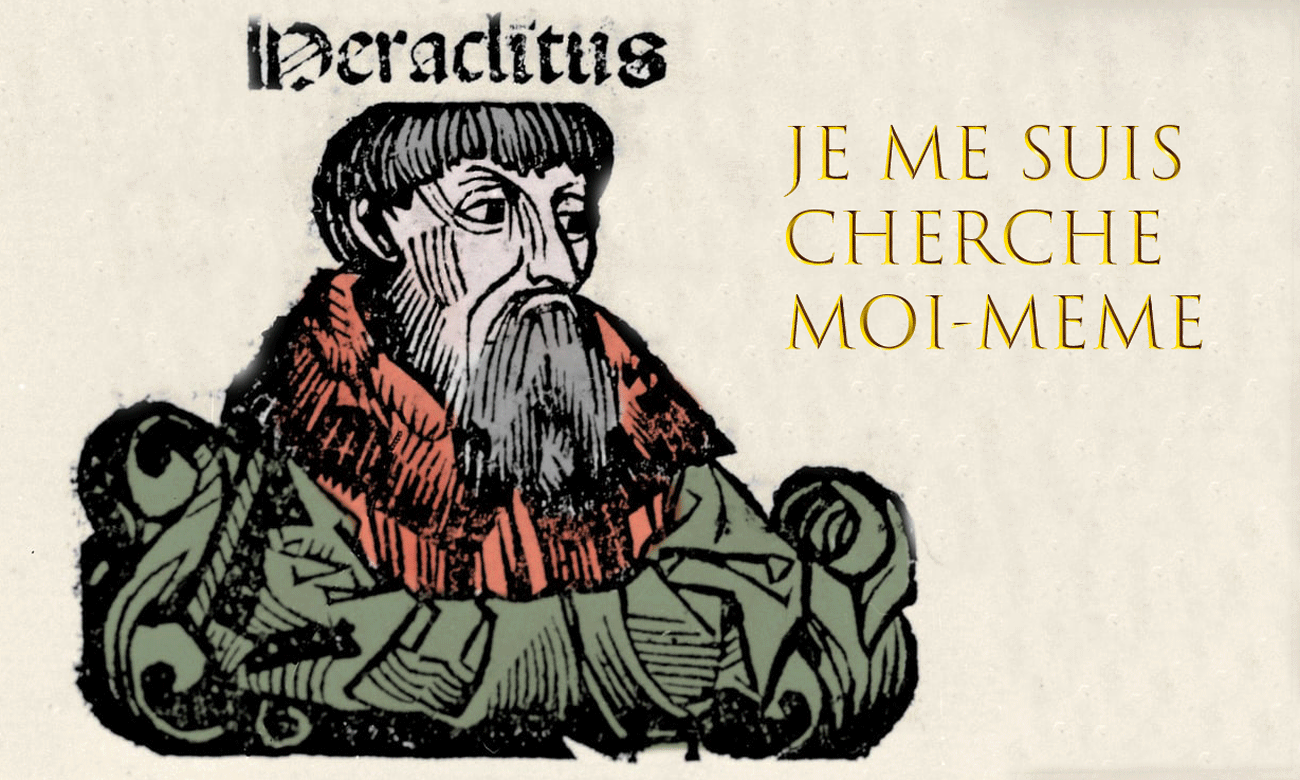
Before Plato, the disciple of Socrates, Greek philosophers were called pre-Socratics. Among this merry band, I’ve kept a special fondness for the most sincere: Heraclitus, who is said to be obscure, but who is so luminous. The original thought of the sage of Ephesus has come down to us in the form of fragments, some of which are pure gold. Enjoy! My commentaries will show you all his light.
If Heraclitus deserves the epithet obscure, it’s because the great sage emanates that obscure clarity that falls from the stars. (Pierre Corneille, Le Cid) The words of the wise man of Ephesus appear in italics and in color. Mine is black and straight.
Word of Heraclitus
This word, which is true, is never understood by men, whether they have heard it before, or are hearing it for the first time. Though all things are done according to this word, they seem to have no experience of words and facts as I set them forth, describing their nature and telling how they are. Men no more realize what they do while awake, than they remember what they did while asleep.
The majority of humans are deeply asleep. Heraclitus was a great awakener. His words enlightened those who seek the Way.
I woke up and I saw that everyone was still asleep. So I went back to sleep.
This is not the opinion of those we meet. They learn, but they don’t know, although they imagine they do. They can neither listen nor speak. So we must follow the common verb; but although it is shared by all, most live as if they had an intelligence all their own. The sibyl, from her raging mouth, throws out words that don’t make you laugh, neither ornate nor festooned. But the god prolongs his voice for a thousand years. Of all those whose speeches I have heard, none has come to understand that wisdom is cut off from all things.
The sibyl was a soothsayer, an inspired woman who foretold the future at Delphi, in the temple of Apollo. Wisdom is cut off from all things because it comes from separate reality. It is a voice from the other world. Down here, madness reigns.
The true wisdom of life is to see the extraordinary in the ordinary.
Gods
Celebrating bloody sacrifices does not purify any better than mud would wash away the stain it has made. Praying to images is like talking to a wall.
Heraclitus spoke out against useless rites, sacrifices and prayers. Following in his footsteps, I warn you: invoke no one.
They don’t know what gods and heroes are.
The ancient Greeks had already forgotten all about our origins. Heraclitus, on good authority, knew the hidden secrets of our past. Those I reveal through this site. For example, I reveal who the gods and heroes are.
If all things became smoke, we’d know through our nostrils.
Why live in the dictatorship of a single sense? In this day and age, the eyes come first. But many interesting things cannot be seen with the eyes. “The essential is invisible to the eyes. You can only see well with your heart” said Antoine de Saint Exupéry. I see invisible waves, I feel subtle bodies, auras. Thanks to unconditional love, I repair what needs to be repaired. You can only see well with your heart.
The Eternal One is a child playing pettie; royalty belongs to a child.
This game, pettie, is the ancestor of chess. Here Heraclitus is in direct opposition to Albert Einstein, who could not stand the element of chance in quantum theories. “God doesn’t play dice,” he exclaimed. No, the Eternal One doesn’t play dice, he plays farttie.
There is no difference in kind between the human and the divine. Just a difference of degree.
The god is day-night, winter-summer, war-peace, satiety-hunger. He changes as one mixes perfumes; he is then named according to their scent.
Heraclitus speaks of the inner god. He gives us his changing colors, which modify our mood. The names we give him only describe his movements.
The most beautiful monkey is ugly before mankind. Before God, the wisest man looks like an ape.
Here we see the One God that the Hebrews sincerely believe they invented. Let’s not turn things upside down. Humans didn’t invent God. God invented us.
The god whose oracle is at Delphi does not reveal. He doesn’t hide. He indicates.
At Delphi stood the temple of Apollo, of which we can still see some fine remains. It was here that the Pythia, named after the python, was celebrated, and was undoubtedly reptilian like this animal. Diviners’ revelations only become so in the minds of the ignorant. The diviner sees who the consultant is. What his past has been. What his future may be. When the Pythia speaks, the words come out of her mouth without her knowing who spoke them.
The natural human has no reason, the divine does.
The gods act according to an immutable plan: the development of this planet, the awakening of humans, the triumph of wisdom and serenity. They’ve largely failed in this task because they’re dealing with bloody assholes. As long as we pitiful ants haven’t achieved unity,
We’ll be fighting like lions and panthers.
Wouldn’t it be better if we became brothers?
Victor HugoLe mariage de Roland, La légende des siècles
Reason is intelligence with an office; imagination is intelligence with an erection.
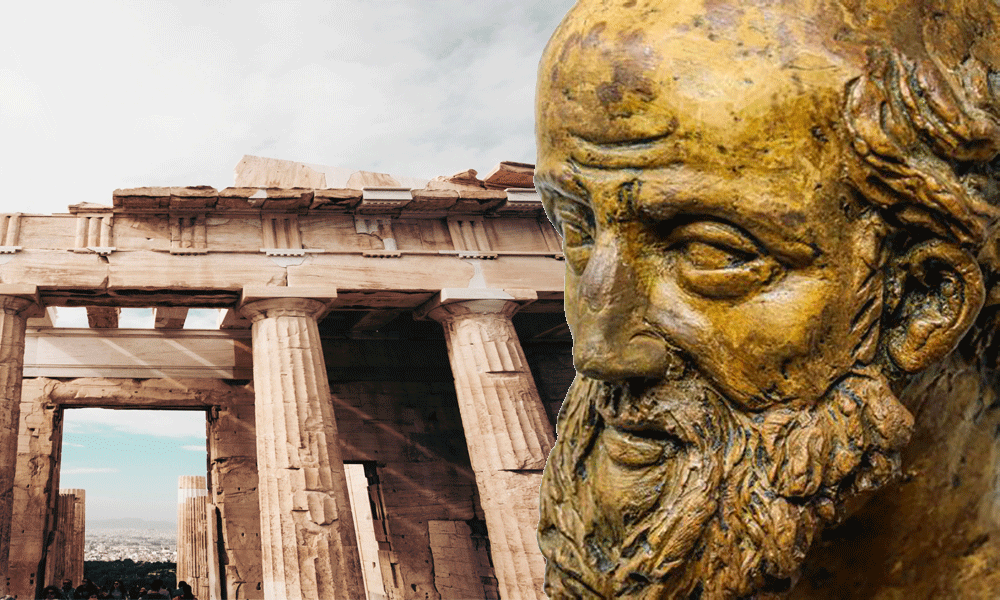
The One
The one, who alone is wise, wants and doesn’t want to be called Zeus. The law and the sentence is to obey the one.
Zeus is but an avatar of the Eternal. Zeus is mortal, even if his life is counted in thousands of years. The Great Goddess, his patroness, has lived for billions of years. Yet she too is mortal, like all living things. Let’s not confuse the Source with the gods.
The only wise thing is to know the thought that can govern everything everywhere.
And it’s not a thought. It doesn’t come from brain, but from the heart. What rules everywhere is the law of love. It’s the law of One. It’s the law of the Source.
It is not to me, but to the logos that it is wise to grant that the One becomes all things.
The logos dear to the Greeks is creative thought. I don’t know if there is such a thing. But it must be said that the Hebrews believed in it, at least those who wrote: The Word became flesh. This Word is the Logos.
War
The gods and men honor those who succumb to war. War is common, justice is discord, and everything is made and destroyed by discord.
It would be less hypocritical, in fact, to honor war, that bloody scum. Heraclitus will do just that, knowing that from opposition comes compromise. From discord comes unity, which for Heraclitus is the universal principle.
War is the father of all, the king of all, who has designated these as gods, these as men, these as slaves, these as free.
Heraclitus does not advocate war. He asserts that neither chance, nor blind fate, nor karma, nor predestination decide all things. They derive from the law of the victor.
There is no such thing as chance. Everything that happens is wanted.
Discord and Unity
What is contrary is useful; what struggles forms the most beautiful harmony; everything is made by discord. Join what is complete and what is not, what is in harmony and in disharmony; of all things one and of one, all things. They don’t understand how that which struggles with itself comes into harmony. The harmony of the world is in opposing tensions, as in the lyre and the bow. There is a hidden harmony, better than the apparent one, where the god has blended and deeply hidden differences and diversities.
Heraclitus is opposed to excess, and discord is excess. So he doesn’t preach discord as a rule of life. It’s complementarity that concerns him. From complementarity will emerge the One.
The unintelligent who listen are like the deaf; the proverb testifies that, however present they may be, they are absent. The foolish man is put off by any speech. It’s better to hide your ignorance, but that’s difficult when you’re inattentive or drunk.
Yet another triumph for logos, Heraclitus’ true god. When he speaks of the One, is he speaking of the logos? If so, logos would be equivalent to the Holy Spirit of the Christians, or Wakan Tanka, the Great Spirit of the Amerindians.
Dogs bark at those they don’t know. What is their wit or intelligence?
I agree with Heraclitus that cats are far more intelligent than dogs, those degenerate wolves. Calling someone “dog” is harsh. Calling one’s sweetheart “my little cat” is sweet.
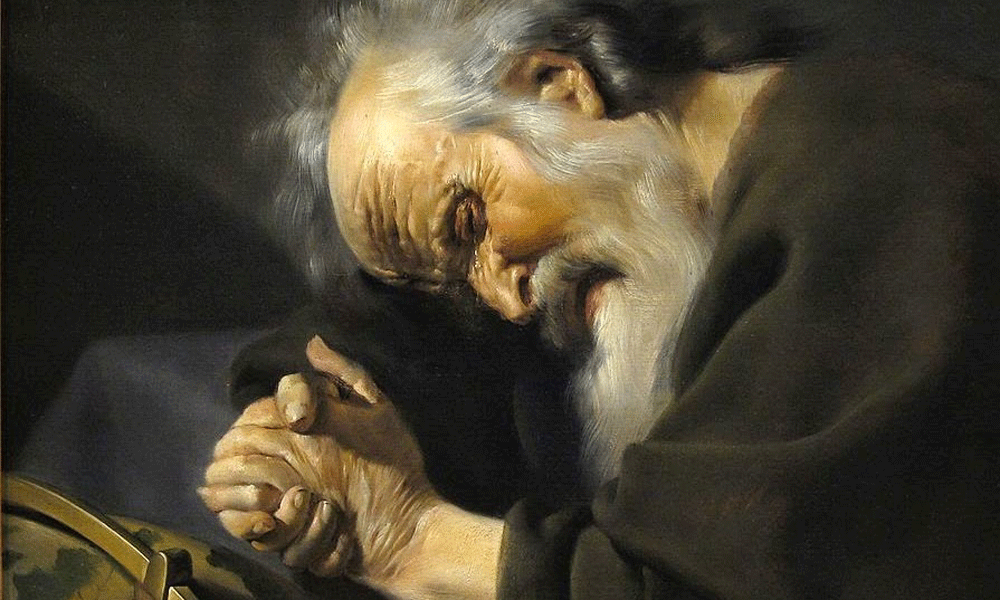
Justice
We wouldn’t know the word justice if it weren’t for perversity. The tested man knows how to keep his opinions; the punishment will reach the craftsmen of lies and false witnesses. The people must fight for the law as for its walls.
Here, Heraclitus seems to place too much trust in the justice of men. Elsewhere, he distrusts it. The difficulty in seeking unity in these fragments is that most of his work is missing. But his obscure nickname dates back to the Greeks, who possessed the entire book…
The Sun will not exceed the measurements; if it does, the Erinyes, Zeus’ followers, will know where to find it.
The Sun in question is not the star of the day, but the great mother ship where the former gods reside. If the mother ship ever oversteps the mark, goes off course and wreaks havoc on Earth, Zeus’ followers will put things right. So the vessel piloted by Apollo or his son Phoebus went off course. The Atlantis piloted by Atlas fell back into the Atlantic Ocean, triggering an enormous tsunami that ravaged both shores.
Death
Men neither hope nor believe in what awaits them after death.
What awaits them after death is a profound mystery, as long as the living have not gone there to see. And as long as he is not dead, can he be sure of what he has seen?
When they are born, they want to live and suffer death, and leave children for death.
It is our lack of wisdom that the wise man of Ephesus denounces. Why give birth if it means condemning our children to death? A vision that the ordinary man will find pessimistic, but which is wisdom for the warrior of light.
A warrior treats the world as an infinite mystery,and what people do as an unlimited folly.
Immortals are mortal, and mortals immortal; one man’s life is another man’s death, one man’s death another man’s life.
Heraclitus knew that the gods are mortal. All the gods. He also knew that supra-consciousness, the Goddess’ gift to humans, allows us to taste eternal life … provided we undergo the hardest of initiations.
“If you don’t die while you are alive, you will die while dying”
Same thing what lives and what is dead, what is awake and what is asleep, what is young and what is old; for the change of the one gives the other, and vice versa. From there they rise and become vigilant guardians of the living and the dead.
This change will seem inaccessible to most human beings. Yet all it takes is a slight shift in the position of our assembly point to change state, appearance, form, place, planet and so on.
The dead are to be rejected even more than manure.
Let the dead bury the dead, said Jesus, who, had he existed, would no doubt have appreciated the wise man of Ephesus.
Knowledge
Erudition does not teach intelligence; otherwise it would have taught Pythagoras, Xenophanes and Hecataeus. Pythagoras, son of Mnesarchus, more than any other man applied himself to study, and collecting these writings he made his own wisdom, his erudition, a wicked art.
Pythagoras was roundly criticized by Heraclitus, who accused him of stealing his discoveries from the ancient texts he had read. Many plagiarists pass themselves off as geniuses.
What you see, what you hear, what you learn, that’s what I value more.
Experience takes precedence over erudition. Because experience teaches us the real wisdom, the wisdom of life, the wisdom of simple people, the wisdom that academics neglect. Hence their appalling ineptitude.
Like Homer, the wisest of the Greeks, men err when it comes to knowing the obvious. Children, hunting their vermin, deceived him by saying: “What we see and take, we throw away; what we neither see nor take, we carry away”.
“Homer, the wisest of the Greeks.” The formula is ironic, don’t doubt it. Homer and Pythagoras are Heraclitus’ two pet peeves, as this quote makes clear:
Homer deserved to be driven from the contests with a stick, and similarly Archilochus.
I’ve been looking for myself.
On the temple of Apollo at Delphi it is written: Know thyself. Gnothi Seauton.
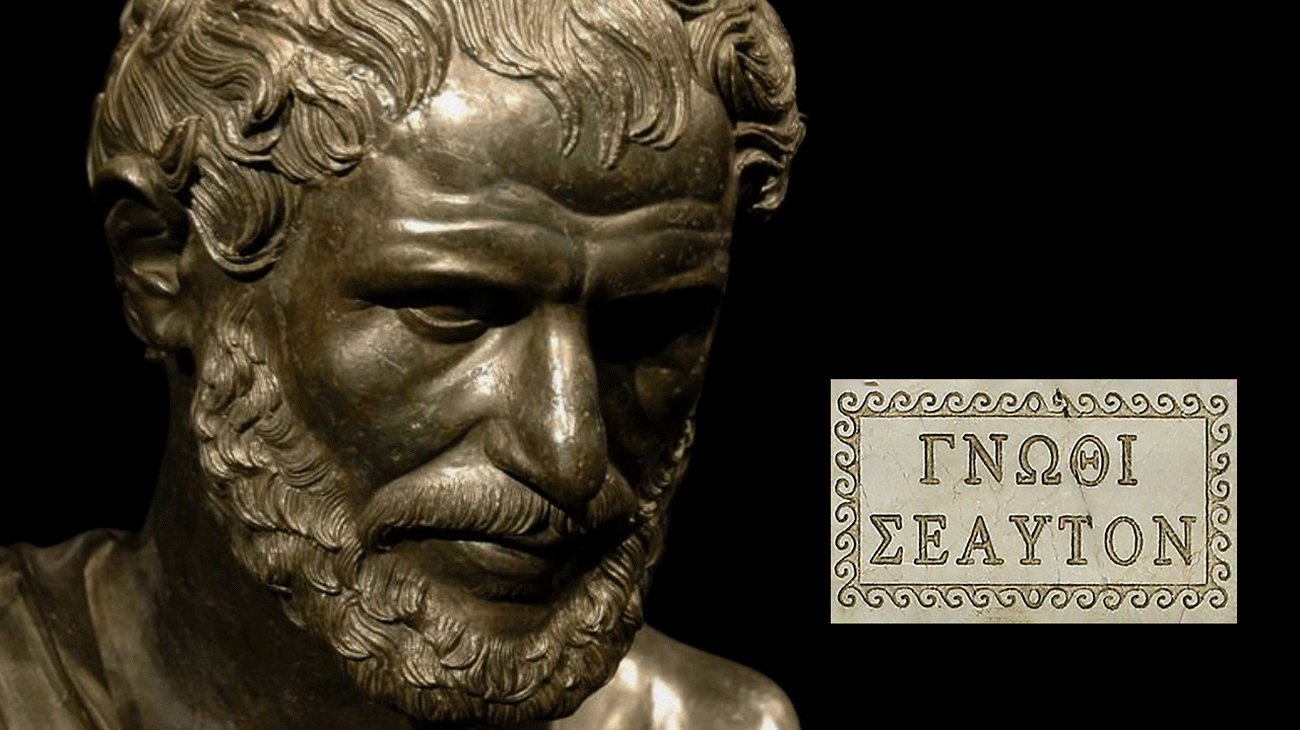
Gold
Those who seek gold dig a lot of earth to find small plots.
Those who seek gold are despicable and vile. Those who find gold lose their souls.
The donkey would choose straw rather than gold.
If you are hungry in a devastated world, what will you do with your gold?
Doctors slash, burn and torture the sick anyway and, doing them a good that is like a disease, demand gold that they hardly deserve.
Healers do no harm and receive no gold for the great good they bring to the sick.
All things are changed against fire and fire against all things, like goods against gold and gold against goods.
Does he mean that fire will be the end of all things? When Yahweh had dried up his great flood and everything had been destroyed by the waters, he made this promise to Noah: Never again will the waters ravage the earth, plants and animals, humans and their possessions. For your next punishment, I will send fire. As a token of his word, Yahweh-God gave mankind the sign of the rainbow.
Had Heraclitus read the Bible? Quite possibly.
Fire
This world was not made by gods or men. It has always been, and always will be, a living fire, lighting up by measure and going out in the same way.
Indeed, none of the gods could have created this world. But many have arranged it. Terrestrial terraforming has made this planet habitable, and this is the work of the former gods.
The coming fire will judge and devour all things. Smothering excess is better than putting out a fire. Fire is indigence and satiety.
Hubris, or excess, is a derangement that characterizes certain gods, such as Pan, the half-man, half-goat satyr, or Dionysus, god of drunkenness, orgies and excess. Dionysus was a very popular god throughout antiquity. Numerous temples can be found all around the Mediterranean basin, alongside those of the greatest gods. In Hellenistic times, he even became a god of civilization, according to Wikipedia. It seems that the wise Heraclitus disagreed.
Who will hide from the fire that never sets?
Is it the fire of the sun? If it doesn’t shine at night, another Sun with a capital letter, the Sun of Hyperborea, never sets on the Earth of men. It shines day and night with an artificial, divine light. No one escapes the inquisitive gaze of the gods of old. So God sees that Eve and Adam have tasted the forbidden fruit. Nothing can be hidden from him.
Soul
Eyes and ears are poor witnesses for men when souls are barbarous.
Barbarous souls cannot bear witness to facts. They are clouded. Their judgement is inept and distorted.
It is not good that men can become what they want.
If they do, they have the support of the Archons. They have sold their souls to the devil, the Christians would say.
All religions are right in what they say, and wrong in what they deny.
A man’s character is his daimon.
The daimon is not a demon, although its etymology. In the same way, Hades, the Greco-Latin Underworld, did not resemble those of Jérôme Bosch. Hades was the abode of the dead. It was not a happy place, but there were no tortures or abominable punishments. The Good Dominican Fathers wanted to scare the hell out of their dissolute flock with a shoddy hell, which they drew from the depths of their tainted minds. And Jérôme Bosch put them in pictures, as any good illustrator would have done. What could be more amusing than to scare the bejesus out of the sheep? Bleating flocks are a joy to behold for any bad shepherd.
Hell is others.
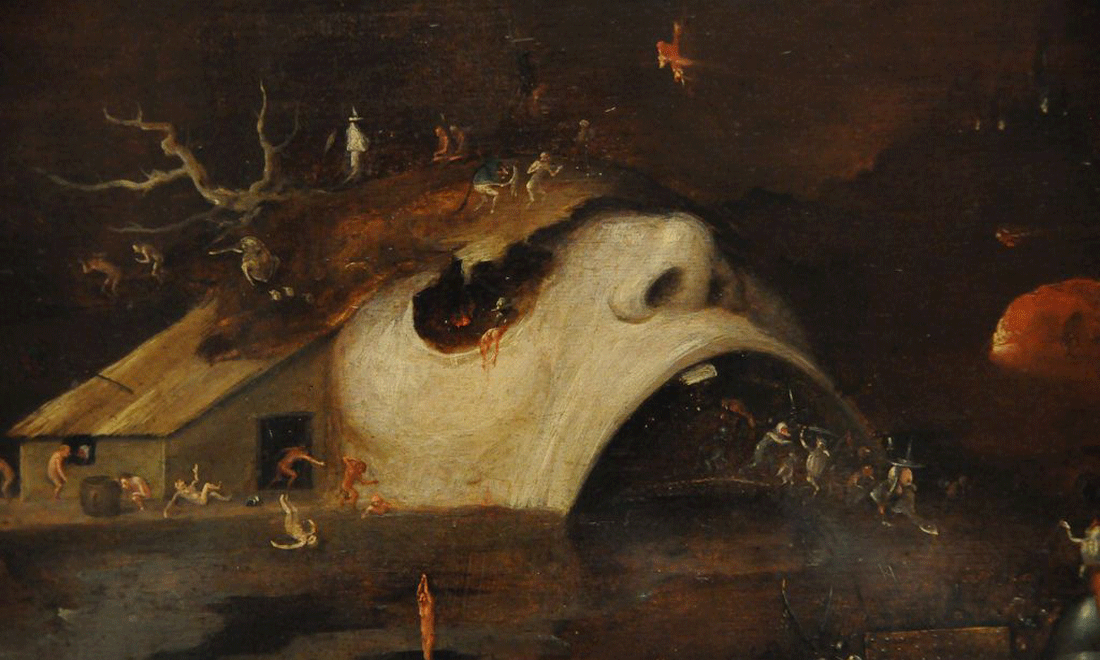
Water
You can’t bathe in the same river twice.
It expresses the impermanence that is the rule of living beings, in contrast to the permanence of the human mind, for which the river is always the same as long as it bears the same name.
The sea is the purest and most polluted of waters; it is drinkable and healthy for fish, but poisons humans.
It is salty and undrinkable for mammals, with the exception of marine mammals.
Lightning
Lightning is the rudder of the universe.
Lightning is a gift from the gods. A first version of this site, published in 2008, was entitled Masters of Lightning. At Avebury in Wiltshire, I had an exact vision of an ancient lightning power station, and how the former gods used lightning for three different and complementary purposes.
It’s the dry soul, the best one, the one that goes through the body like lightning through clouds.
For the ancient Greeks, humidity was a negative thing. A wet soul was fit for Hades, with no hope of ever escaping. A dry soul, on the other hand, was a guarantee of elevation to the gods above.
Ursa Major
The limits of dawn and evening are the Dipper, and opposite the Dipper, the Guardian of sublime Zeus (the Arcture). One and the same path above and below.
Arcture is a variant of Arcturus, one of the brightest stars in the northern hemisphere: the diameter of Arcturus is 25 times that of the Sun. The name Arcturus comes from the ancient Greek Ἀρκτοῦρος / Arktoûros which, formed from ἄρκτος (bear) and οὖρος (guardian), means “the guardian of bears” (due to its proximity to Ursa Major and Ursa Minor, big and small bears).
The reason Heraclitus adds “one and the same path above, below“ is that, because of its brilliance, Arcturus served as a course for ships setting out from Earth towards Alcor, in Ursa Major. Above shone Arcturus, below shone Hyperborea, which, because of its proximity to the Earth, shone day and night much brighter than the little sun.
Translation by the author from Tannery (1887)
